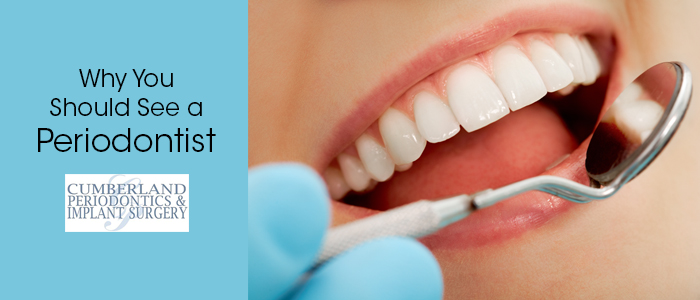Why You Should See a Periodontist
Posted on by adminKnowing when and why you should see a periodontist is something patients often wonder, with many patients not really understanding the title.
A periodontist is best described as a dentist who has trained and specialized in treating the gums, bone and tissues that help connect and support your teeth. This requires years of additional study after graduating as a dentist, therefore being a highly trained and skilled profession.

If you are experiencing symptoms that point toward gum disease, also known as periodontal disease, or periodontitis, then this is certainly a good reason to see a periodontist.
Periodontal Disease
While the term periodontal disease may be unfamiliar, most people are quite aware of the term gum disease, the more familiar name. Gum disease is a global term which covers a range of gum issues, varying in severity, which are caused by bacteria around the teeth. Gingivitis is the mildest level of periodontal inflammation, which, if not treated, can progress to the more severe periodontitis.
Although poor or ineffective oral hygiene can often be the reason behind the disease, there are other reasons that it might develop, such as your diet, stress, or problems with your body’s immune system.
Symptoms of Periodontal Disease
If you are showing any of the following symptoms, it is a clear sign that you should see a periodontist as soon as possible:
- Swollen or bright red gums
- Bleeding gums
- Constant bad breath
- Receding gums (or teeth appearing longer)
- Sensitive teeth, or pain while chewing
- Teeth that are becoming loose
Who is at Risk?
Being diabetic, in addition to suffering from auto-immune diseases, puts you at a higher risk of developing periodontal diseases, such as gingivitis and periodontitis. If you are a smoker, this is known to be another significant risk factor for developing periodontal disease, as well as potentially hindering the treatment.
Additionally, those who are on prescription medication that stems the flow of saliva can also be at an increased risk, as saliva performs an important function of breaking down trapped food particles and maintaining the pH balance in the mouth, preventing both the growth of bacteria, which can inflame the gums, and an overly acidic environment, which leads to tooth damage over time.
Last Word
Knowing how to recognize any potential gum disease at the earliest stages, so that you can see a periodontist before the problem worsens, can help to make the treatment process faster and easier. If you notice changes to your gums, particularly the signs outlined above, make an appointment with your periodontist as soon as possible.

